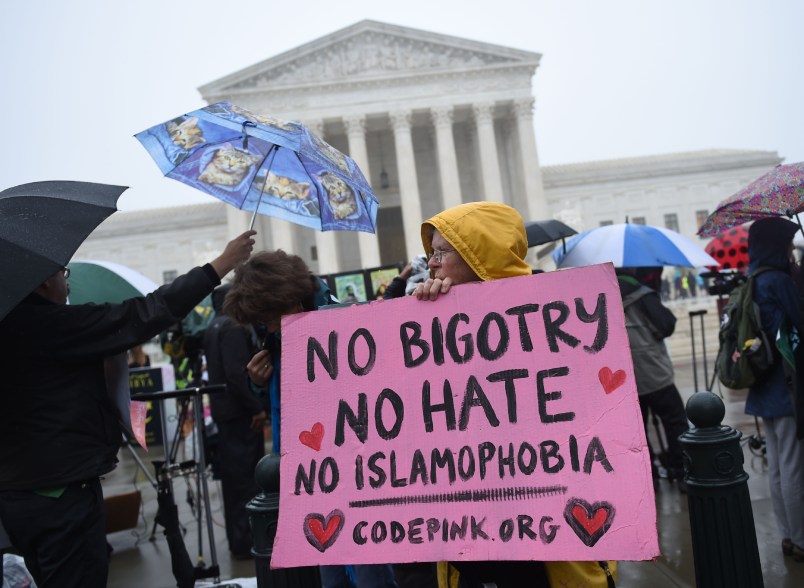Aden Hassan immigrated to the United States from a Somali refugee camp just a week before President Trump’s travel ban went into effect. On Wednesday morning, he spoke before hundreds of protestors in front of the Supreme Court where the justices would be hearing a case challenging the latest iteration of the travel ban, which restricts travel from Somalia and about half a dozen other mostly Muslim countries.

“I and my family came to the refugee camp 20 years ago, where there is no life, there is no food, there is no good education. When I come to the United States, I was expected there to be democracy and welcoming people, but I see that democracy is just the surface,” Hassan told the crowd, which was braving a light, misty rain. “My mother she is still in the camp. She has heart conditions. She has diabetes. I am so worried about her because she has nobody to take care of her because I am the only one.”
It’s been over a year since he’s seen his mother, because of the ban.
According to Wardah Khalid — who works with the Church World Service, which helped settle Hassan and other refugees — the resettlement numbers have “dropped drastically,” with only 11,000 refugees resettled this fiscal year.
“Right now we are only on track to settle 20,000 refugees, which is just abysmal and completely contrary to what America stands for, as a country that has always stood for welcome and refuge,” she told TPM outside of the courthouse, about an hour before oral arguments were scheduled to begin.
Hassan was just one of dozens present at the Supreme Court’s front patio who said the ban has personally affected their lives.
A rainy morning isn’t keeping protestors of Trump’s travel ban from the Supreme Court, which is hearing a case challenging it today pic.twitter.com/Pl06vX8XFR
— Tierney Sneed (@Tierney_Megan) April 25, 2018
Jaylani Hussein, the executive director of CAIR Minnesota who is originally from Somalia, said that his family and friends have been blocked from traveling by the ban.
“This has impacted all of us, and it has impacted us in many ways, including people leaving the country,” Hussein told TPM. ” I remember talking to a family of three, where the husband was so worried — even though he had a clear path to citizenship — he was so worried that he’d travel in the middle of winter and entered Canada. It has created a lot of fear.”

The demonstrators said they hoped, beyond considering the legal issues surrounding the policy, that the justices would think of its practical effects.
Arjun Sethi, a Georgetown Law professor, said that the travel ban was a “destructive policy that has separated families, deprived people of life-saving health care, denied people education and deferred dreams.”
“It would be very easy for the Supreme Court justices to just focus on the legalese, but President Trump from the very beginning has made is intent clear all along,” Sethi told TPM, referencing Trump’s campaign promises to ban Muslims from entering the United States. “The fact of the matter is this is a policy that is rooted in discriminatory intent, rooted in bigotry and the court should call it out as such.”
Rep. Judy Chu (D-CA), a sponsor of legislation that would defund implementation of Trump’s ban, spoke to the crowd and recalled the scene at Los Angeles airport the weekend the administration imposed the first version of the ban in January 2017.
“I saw hundreds of people that turned into thousands of people that came out from every race, every religion to protest the Muslim ban and make sure that travelers that came here felt safe,” Chu said.
The initial iteration of the travel ban was struck down by courts, and the second attempt also saw multiple rulings invalidating it, though the Supreme Court allowed it to go forward with some tailoring. As for the third version, which the Supreme Court weighed Wednesday, the high court allowed it to go into full effect in December while the justices prepared to hear the case.
“While lawyers are inside showing that this ban violates our laws, the people outside are declaring that it violates our American values,” Chu told the crowd. In front of the stage were mock passports from Sudan, Libya and other countries affected by the ban.
Good morning from the Supreme Court, where the Justices will hear arguments over Trump’s travel ban. I’m in the courtroom for @TPM . https://t.co/HCzl2JXDxu pic.twitter.com/YO1QtzDg6w
— Alice Ollstein (@AliceOllstein) April 25, 2018
The program of speakers included Libyan-American poet Thana Hasan.
She recited one of her poems, which had the refrain, “you bomb us, then ban us.”
“Please don’t bomb us if you plan on banning us,” she said.







I wish I was there. It would be fascinating to talk to them.
It’s purpose.